Latest News
STEM Access & Diversity: African American History Month Champions of Change
Posted by on March 10, 2014 at 1:09 PM EDTLast week the White House Office of Public Engagement, along with the White House Initiative on Educational Excellence for African Americans, honored ten Champions of Change in honor of their achievements and contributions to exposing and accelerating Science, Technology, Engineering, and Math (STEM) opportunities for more African American youth and communities. Each of the Champions founded innovative ways to inspire interest and provide access for African American youth in STEM whether it’s through hackathons, technology programs for girls of color in underserved school districts, skill development summer programs or STEM enrichment programs for educators. They created opportunities based on their own personal experiences of what they never had growing up.
Kalimah Priforce was inspired to pursue a career in STEM when he was in grade school and enrolled in a science camp. Coming from a group home, he was excited to experience his favorite subjects in a new environment. As he stood at the bus stop in front of his group home, Kalimah watched the science camp bus drive right past him. Left with disappointment, that moment was the turning point in his life – he had to get out and take control of his own life. Today, he uses web and mobile-based technology, hackathons with young men of color, to promote mentorship and innovation in technology as a creative outlet instead of an unconquerable challenge. Danielle Lee never let her grade point average define her career or dreams. She went from being a C-student in Biology to having a PHD in Biology. She looked beyond the classroom to apply her technical skills and found creative solutions to everyday problems, even rewiring the electricity in her home so that she could have a television in her room.
In 2012, President Obama launched the White House Initiative on Educational Excellence for African Americans to help accelerate national efforts to support African American students – because improving educational opportunities for all students is critical to ensuring we increase college completion and employment rates to strengthen our nation’s economy.
These STEM Champions are using strategies that support investments even in our youngest learners which we know will enhance “Opportunity for All,” the center of the President’s State of the Union speech this year, and enable them to pursue and persist in college and specialized training for STEM careers. The future of our country depends on both improving youth access to these fields and ensuring that their interest and skillset is encouraged, developed, and promoted beyond the classroom.
Rumana Ahmed is an Executive Assistant to the Director of Public Engagement
Learn more about Education, TechnologyContinuing the Progress with Tribal Communities
Posted by on March 6, 2014 at 5:50 PM EDTToday, we are releasing the synopsis from the 2013 Tribal Nations Conference and the 2013 White House Tribal Nations Conference Progress Report. The 2013 Conference marked the fifth consecutive year that President Obama hosted a gathering of federally recognized tribal leaders and officials from across the Administration. At the Conference, tribal leaders directly engaged with the recently established White House Council on Native American Affairs and discussed key issues facing Indian Country. During his remarks to tribal leaders, President Obama emphasized the need to keep our bond of peace and friendship, our covenant chain with tribes strong not only for this generation but for future generations.
The Synopsis reflects the wide-array of issues and comments raised by tribal leaders during the break-out sessions; including economic and energy development, education, public safety, health care, and land and natural resources. The Tribal Nations Conference Progress Report provides a comprehensive overview of federal agencies’ progress in 2013 toward making improvements in Indian Country and highlights the following:
-
The President signed Executive Order 13647 establishing the White House Council on Native American Affairs consisting of Cabinet Secretaries and heads of other federal agencies and is responsible for coordinating policies across the federal government.
-
The President signed the Violence Against Women Reauthorization Act of 2013 (VAWA 2013) which contains provisions that significantly improve the safety of Native women and allow federal and tribal law enforcement agencies to hold perpetrators of domestic violence accountable for their crimes.
-
The President signed a significant amendment to the Stafford Act, which gives tribes the option of directly requesting Federal emergency or major disaster declarations, rather than receiving a declaration through the request of a Governor.
- The Department of the Interior announced the first offers in the land buy-back program for Tribal Nations to initiate land consolidation efforts from the Cobell Settlement.
The President and his Administration remain committed to strengthening the nation-to-nation partnership with tribes to address the complex challenges facing Indian Country. The 2013 Conference also provided an important policy and engagement foundation for the White House Council on Native American Affairs as we work to address those challenges and meet our common goal of developing more prosperous and resilient tribal communities.
Jodi Gillette is the Senior Policy Advisor for Native American Affairs in the White House Domestic Policy Council.
-
The President signed Executive Order 13647 establishing the White House Council on Native American Affairs consisting of Cabinet Secretaries and heads of other federal agencies and is responsible for coordinating policies across the federal government.
President Obama Hosts First-Ever White House Student Film Festival
Posted by on March 6, 2014 at 5:28 PM EDTOn Friday, President Obama hosted the first ever White House Student Film Festival, demonstrating the Administration’s commitment to bringing America’s classrooms into the 21st century with high-speed internet and cutting-edge educational technology. The President recently set a goal of providing 99% of America’s students with these technologies, through placements in schools and libraries, by the year 2018.
At the film festival, the President recognized 16 of the nearly 2,500 films submitted by K-12 students in response to the White House’s call for videos showcasing the positive role technology plays in education.
Seventeen-year old Kira Bursky’s short film was one of the 16 selected by the White House to be featured at the festival. Her video, titled “Hello From Malaysia”, chronicles how Aiman, a young immigrant from Malaysia, uses technology both to share her culture and build connections with her new classmates.
Aiman’s journey to learn English, work hard in school, and build a new American life, reminds us of the immigration stories of individuals all across the country, including the struggles many immigrants face each day.
People from all around the world are drawn to the United States by a belief in the power of opportunity. Throughout the White House, there are similar stories of staffers and their families who through hard work and sacrifice came to the United States to pursue their version of the American dream. In fact, last year, the White House chronicled these immigrant stories, in this video.
Aiman’s journey, reminded me of the story of my own childhood growing up in Chicago’s Little Village surrounded by hard-working immigrant families. Although every immigrant’s story is fiercely unique, one aspect holds true within us all: the power of an immigrant family to overcome adversity is strong.
Today, there are students, workers, entrepreneurs, faith leaders, families, and many others who want to help us write the next great chapter of the American story. Passing commonsense immigration reform will enable many to do so – it is not only good for immigrants themselves but also for our economy. In fact, according to independent experts, the bipartisan Senate bill would reduce deficits and grow the economy by more than 5% or 1.4 trillion dollars by 2023. That’s why President Obama continues to urge Congress to take action on immigration reform this year.
America’s rich tradition as a nation that welcomes immigrants is in full display in Kira Bursky’s video and we were excited to feature her and many other young filmmakers today at the White House.
Jorge Neri is Associate Director of the White House Office of Public Engagement.
President Obama, Secretary Kerry and Secretary Lew Underscore and Reaffirm the Strength of the U.S.-Israel Relationship
Posted by on March 6, 2014 at 10:50 AM EDT“We do not have a closer friend or ally than Israel and the bond between our two countries and our two peoples is unbreakable.”—President Barack Obama, March 3, 2014, Bilateral Meeting with Israeli Prime Minister Benjamin Netanyahu.
The beginning of March provided several important opportunities for President Obama and senior administration officials to underscore that unshakeable bond between the United States and Israel. As they do every year, thousands of delegates to the American-Israeli Public Affairs Committee (AIPAC) 2014 Policy Conference came to Washington for an annual event that attracts bipartisan support. Prime Minister Netanyahu’s appearance at AIPAC provided an opportunity for a meeting with President Obama at the White House. The two leaders discussed the status of the talks between the Israelis and Palestinians, progress on the P5+1 negotiations with Iran regarding Iran’s nuclear program, and regional issues, including the situations in Syria and Egypt. As the President noted in his public remarks at the beginning of the meeting, “on a whole spectrum of issues we consult closely; we have the kind of military, intelligence and security cooperation that is unprecedented. And there is a strong bipartisan commitment in this country to make sure that Israel’s security is preserved in any contingency.”
Watch the video of the opening remarks by President Obama and Prime Minister Netanyahu at the beginning of their bilateral meeting below:
To read a transcript of the remarks, click here.
Secretary Kerry’s Speech to AIPAC
On Monday, March 3, Secretary of State John Kerry addressed the AIPAC 2014 Policy Conference about the negotiations over Iran’s nuclear program and the Israeli-Palestinian negotiations.
On Iran, Secretary Kerry reaffirmed the Obama Administration’s bottom-line in the negotiations: “let me sum up President Obama’s policy in 10 simple, clear words, unequivocal: We will not permit Iran to obtain a nuclear weapon.” While the United States seeks to achieve this goal through diplomacy, Secretary Kerry reiterated that “no deal is better than a bad deal” and emphasized the following:
"[T]he United States will only sign an agreement that answers three critical questions the right way. First, will it make certain that Iran cannot obtain a nuclear weapon? Second, can it continuously assure the world that Iran’s program remains entirely peaceful as it claims? And third, will the agreement increase our visibility on the nuclear program and expand the breakout time so that if they were to try to go for a bomb, we know we will have time to act?"
Turning to his tireless efforts to support the direct Israeli-Palestinian negotiations to end the decades-old conflict, Secretary Kerry described how he is working hard to help the parties reach a two-state solution that brings Israelis the security and peace they deserve and the Palestinians the freedom and dignity they deserve:
"My friends, we understand that Israel has to be strong in order to make peace. But we also understand that peace will make Israel stronger. Any peace agreement must also guarantee Israel’s identity as a Jewish homeland. As [former Israeli Prime Minister] Ehud Barak said on this stage last year, a two-state solution is the only way for Israel to stay true to its founding principles – to remain both Jewish and democratic."
To read the full transcript of Secretary Kerry’s remarks, click here.
Secretary Lew’s Address at AIPAC
Treasury Secretary Lew emphasized that the U.S.-Israel relationship, which is "rooted in our shared story of people yearning to be masters of their own destiny, is as vibrant as ever.” Since the Department of the Treasury has the responsibility for administering and enforcing the existing sanctions against the Iranian regime, Secretary Lew described the administration’s vigorous enforcement of existing sanctions and emphasized that notwithstanding the limited relief that has been provided under the Joint Plan of Action, Iran is not “open for business”:
"Even as we pursue diplomacy, and even as we deliver on our commitments to provide limited sanctions relief, the vast majority of our sanctions remain firmly in place. Right now, these sanctions are imposing the kind of intense economic pressure that continues to provide a powerful incentive for Iran to negotiate. And we have sent the very clear signal to the leadership in Tehran that if these talks do not succeed, then we are prepared to impose additional sanctions on Iran and that all options remain on the table to block Iran from obtaining a nuclear weapon."
To read the full transcript of Secretary Lew’s speech, click here.
Matt Nosanchuk is an Associate Director in the White House Office of Public Engagement.
"We Are All Our Brothers' Keepers"
Posted by on March 5, 2014 at 7:33 PM EDTEd. note: This is cross-posted from United States Department of Justice.

Photo Courtesy of Department of Justice.Last week I attended the President’s announcement of his new initiative, “My Brother’s Keeper,” a plan to make sure that every young man of color who is willing to work hard and play by the rules has the chance to reach his full potential. The initiative is aimed at finding ways the federal government, community leaders, the private sector and philanthropies can create more opportunities for young men of color and send the message that our country is stronger when all Americans are doing well.
A key goal of this effort is to address the overrepresentation of African American and Latino men in the criminal and juvenile justice systems and reduce the rates of violence and victimization that they experience. At the Office of Justice Programs we’re taking what we know about adolescent development and working to promote a juvenile justice system that is both effective and fair.
Research from the Centers for Disease Control and Prevention shows that African American young men between the ages of 16 and 19 have the highest rate of violent victimization of any race or age group. For African American young men between 10 and 24, homicide is not only the leading cause of death, but it results in more deaths than the next four leading causes combined. Homicide is the second leading cause of death for Latino youth in the same age group. At the same time, the rates of arrest and incarceration for young men of color are disproportionately high. African American youth make up just 16 percent of the overall youth population but more than half of the juvenile population arrested for committing a violent crime. As the President said, “these statistics should break out hearts. And they should compel us to act.”
It is in our collective interest to recognize that the image many people of color have of our criminal justice system is that it is biased against their young men. We need to simultaneously work to build trust and to end the violence that threatens so many of our youth. The reality is that no one wants to see these problems – not the families who live in these communities, and not the officers who keep the communities safe. The Justice Department’s COPS Office and Community Relations Service, for example, are striving to build trust and mutual respect and a stronger relationship between law enforcement officials and the neighborhoods they serve. These programs work closely with law enforcement and human service agencies to identify these challenges and design effective solutions.
At the Department of Justice we are engaged in a number of efforts to encourage and facilitate this collaboration. The National Forum on Youth Violence Prevention, which is led by the White House and involves the Justice Department and other federal agencies, brings all major community stakeholders together to develop strategies for addressing youth violence – citizens, community and faith-based groups, law enforcement, public health, businesses, and philanthropies. Our Office of Juvenile Justice and Delinquency Prevention also manages the Community-Based Violence Prevention Demonstration Program, which supports evidence-based violence reduction efforts that involve community residents in changing norms and helping their youth find a way to avoid crime and violence. Through the Defending Childhood initiative, we are promoting early intervention programs designed to put kids who are exposed to violence back on the path to healthy development and steer and harmful behavior. And we provide support for mentoring services that help children who have parents behind bars, and work to keep young people from entering the school-to-prison pipeline.
But the Department of Justice is only one part of the response. The “My Brother’s Keeper” initiative will rely on the resources of the private sector and philanthropies to use evidence-based solutions to strengthen and replicate programs that work, and reinforce to our young people the message that their country believes in them enough to invest in their success.
Working together, we can – and will – make a difference.
Karol V. Mason is the Assistant Attorney General for the Office of Justice Programs
Shaping the Next Generation of STEM Entrepreneurs
Posted by on March 5, 2014 at 3:36 PM EDT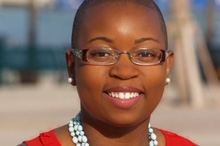
Felecia Hatcher is being honored as an African American STEM Champion of Change.
Our kids and our nation are in a state of emergency. Most of our youth regardless of economic standing have a mindset shaped by materialism and the consumption of technology with a total disregard to understanding tech, becoming technology producers, and community change agents. The lack of interest in tech fields is exasperated by institutions and youth organizations that get kids excited about technology or entrepreneurship only to give the youth tons of information, tell them to come up with an idea, never to help the student go through the actual process of turning their idea into a tangible product. Parental involvement is also not a focus in most tech programs even though studies have shown that parental involvement is a major factor in the academic success of students, a source of direction, and inspiration. These problems are more prevalent in African American and Caribbean communities due to a lack of resources such as: a desire to “help, build, and connect with” such communities, continual brain drain and urban flight since desegregation, lack of funding and understanding of the funding requirements of organizations, tech informed organizations and institutions, facilities, trained professional volunteers, and leadership knowledgeable of the tech industry and focused on the future life of the students.
Code Fever was founded in April 2013 and offers weekend trainings, winter and summer boot camp sessions, and has completed a full-fledged six-week program that took place in Broward County Schools in January 2014 with South Florida Cares Mentoring Movement. At Code Fever we’ve merged technology and entrepreneurship in our programs to shift the mindset of young adults and adults from technology consumers to technology producers and community change agents. With our heavy entrepreneurial focus in the program curriculum the students learn not just ideation and technical training, they gain insight into bringing their product to market with pitch training, and a demo day with community leaders and potential investors. Tech professionals and startup founders motivate both parents and students through our panel discussions about technology, the trajectory of technology careers, and entrepreneurship in tech.
Our sole objective is for the students to have something tangible to walk away with at the end of our programs, be prepared to fill tech positions or create tech jobs, see tech in every industry of a digitized nation, and to inform those that influence conversations at home and in organizations.
Code Fever is a passion project for Felecia Hatcher and Derick Pearson. Without passion in the leadership of an organization the missions of the institution will fail and the future of the students will suffer. We have created a program that focuses on equipping low-income, high-potential kids in our community with the technology and entrepreneurial skills needed to write their own meal tickets. These TUAs, Targeted Urban Areas, are predominately made up of people who look like us, are African American and Caribbean, and deserve a chance. Chances can only be given by those willing to give a helping hand or an opportunity. Code Fever is willing to continue giving a helping hand along with our many partners, volunteers, and financial supporters.
Felecia Hatcher is the Co-Founder of Code Fever, an initiative that trains African American youth in the areas of technology and entrepreneurship.
Learn more about TechnologyUsing STEM to Grow Strong Children
Posted by on March 5, 2014 at 3:21 PM EDT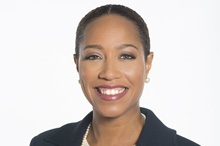
Dr. Reagan Flowers is being honored as an African American STEM Champion of Change.
My passion and drive for helping children learn and succeed runs deep. As a child I failed the second grade and was, unfortunately, labeled a slow learner. Since education wasn’t reinforced in my broken home I was simply promoted from one grade level to the next one without acquiring basic skills. Subsequently, I was moved to a small town in Mississippi and attended a rural school where, for the first time, teachers invested in me personally and made me feel like I could achieve. I was a fifth grader when I started that school, but I’d never learned to multiply. With the support and guidance of several caring teachers I began to thrive as a student, and during my sixth grade school year I’d made the honor roll and was even becoming a math wiz! Thus, my calling to help other children rise above their challenges began.
I started my career as a science teacher at Jack Yates High School in Houston, Texas. In an effort to give my students hands-on experiences with real world problems, I enrolled them in a national robotics competition. Those students, who were of mixed performance levels on campus, had no prior robotics experience nor had they been placed in such a competitive environment. My students were initially intimidated and doubtful about the competition. However, the group outperformed everyone’s expectations. While their performance in the competition was encouraging, it was also very humbling because I saw first-hand the stark reality of the vast academic achievement gap between my students and their peers from other schools. This experience caused me to take up a new mission: closing the academic achievement gap.
In 2002, I founded C-STEM (Communication-Science-Technology-Engineering-Mathematics) Teacher & Student Support Services, Inc, the first integrated Pre K through 12th grade STEM enrichment program in the nation. The distinguishing factors of C-STEM Pedagogy and research model include: integrating communications (literacy) in STEM to ensure students can read, comprehend, write, and articulate solutions to math and science problems; implementing a curriculum influenced by STEM industries; developing a unique collaborative model that creates Pre K -12th grade pipelines; supporting interdisciplinary teacher teams through training and supplemental workshops; providing schools with innovative STEM instructional tools and resources; and developing competitive environments that support high performance and accountability for both teachers and students. In implementing C-STEM I have found teachers to be more effective in the classroom with connecting state approved curriculum to the real-world, which allows students to think critically and problem-solve. I find that C-STEM students are particularly drawn to the program because it helps them understand how STEM applies to their life and the world.
It is imperative that our schools remain leading authorities in STEM education worldwide. To accomplish this, educators must have adequate training, funding, and partnerships that aid in their development and leadership. This enables teachers to continue to inspire innovation, creativity, and exploration with their students. In my efforts I’ve also recognized that economic development in STEM is instrumental to future innovations. This is why my STEM approach provides support and services aimed at creating and sustaining STEM learning environments that are inclusive, equitable and level the playing field for the underserved and underrepresented. Children cannot dream or become that which they have not been exposed to, which is why opportunities provided by C-STEM create unlimited possibilities in communities across the United States.
Since founding C-STEM Teacher and Student Support Services, Inc. in 2002, the organization has grown from 20 students working out of the janitor’s workspace in a school building to impacting over 100,000 students. I have great success stories of students impacted by C-STEM that have completed college, are currently working as STEM professionals, volunteer with C-STEM, train teachers, mentor students and donate to support the organization that supported them. Their success and my triumph is proof that every student has potential and promise. At C-STEM, “Everyone is an Artist and an Engineer”.
Dr. Reagan Flowers is the founder of C-STEM, the nation’s first integrated STEM enrichment program for Pre K through 12th grade.
Learn more about TechnologyTurning Children Into Agents of Change
Posted by on March 5, 2014 at 3:06 PM EDT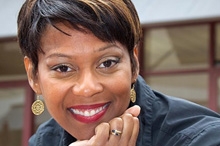
Kimberly A. Scott is being honored as an African American STEM Champion of Change.
I have always believed that all children can innovate and be change agents if provided the proper resources and learning environment.
This vision means collaborating with those individuals who are underserved – through race, ethnicity, gender, poverty, – so that they can access and master the technological tools to further our communities. Creating an educational setting that values students’ identities and cultures is key in this digital age.
CompuGirls engages young girls from the ages of thirteen to eighteen in the digital world. By learning how to research and innovate with technology, girls increase their computational thinking and techno-social analytical skills.
I developed this program through my work at Arizona State University as Associate Professor of Women and Gender studies in the School of Social Transformation when it became increasingly clear to me that girls and young women from underrepresented communities are not entering or persisting in one of the most lucrative and stable careers—technology.
Consider that a new analysis of test-taking data recently reported in Education Week found that no female, African American, or Hispanic students took the Advanced Placement exam in computer science in Mississippi and Montana. Overall, of the 30,000 students who took the exam last year, less than 20 percent of those students were female. A 2012 study by the National Center for Women and Information Technology reported that only 3% and 1% of the United States computing workforce are African American and Hispanic women, respectively. Native American women majoring in computer and information sciences represent less than 1%. Yet, many girls belonging to these racial and ethnic groups are very interested in technology. Sadly, too many of the offered courses and activities are culturally irrelevant causing these prospective technologists to ultimately find the discipline boring. The persistent absence of these indivdiuals can lead to costly consequences for our society.
Since it began in 2007, CompuGirls has expanded from the Phoenix metropolitan area to Colorado, educating girls about social problems and nurturing skills they can use now and in the future. Girls in the program identify and research a social or community issue that is important to them, analyze the issue and ultimately come up with and present a solution. In this way, the technology becomes a means to the research. By using a peer mentoring approach, CompuGirls creates connections that support lifelong skill development in an empowering, creative and fun environment.
Being named a STEM Access Champion of Change is not only a distinct honor in my career, but also an acknowledgement of the need to teach girls technological skills in an engaging and transformative way, that will, in turn, add intellectual diversity and talent to our country’s workforce.
Kimberly A. Scott is the founder of CompuGirls, Associate Professor of Women and Gender studies in the School of Social Transformation at Arizona State University and Affiliate Faculty in George Mason University’s Center for Digital Media Innovation and Diversity. In addition to publishing in refereed journals, writing op-ed pieces, technical reports, book chapters and pieces for the Huffington Post, Scott is co-author of Kids in Context (2005, Rowman and Littlefield), and co-editor of Research in Urban Educational Settings: Lessons Learned and Implications for Future Practice (2011, IAP).
Learn more about Technology
- &lsaquo previous
- …
- 41
- 42
- 43
- 44
- 45
- 46
- 47
- 48
- 49
- …
- next &rsaquo


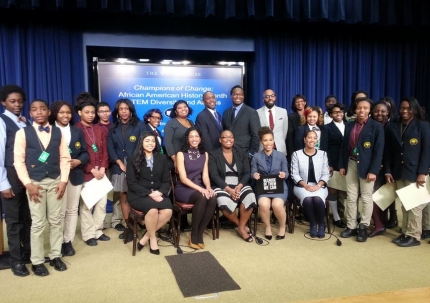
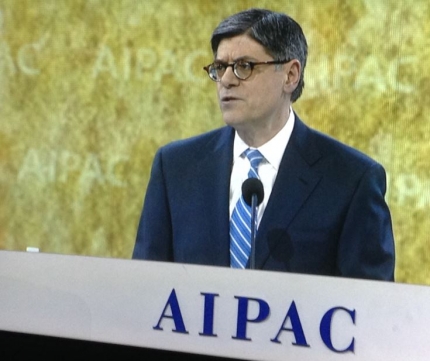

Twitter